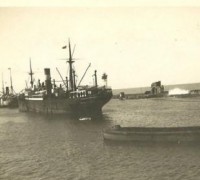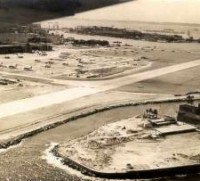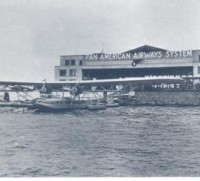BRAZIL THE FORGOTTEN ALLY - BRAZIL X USA
4)BRAZIL WAR AIMS
WHAT DID YOU DO IN THE WAR ZE CARIOCA?
By Frank Mc D. Cann. University of New Hampshire.
By late 1942, Brazil was securely in the American camp and its military officers were talking about committing combat troops. Oddly, after having been pursued since 1938, the Brazilians now found that the cadence and direction of the dance had shifted, they now had to hurry after the Americans, whose concern for Brazil declined as the Germans were driven back across North Africa. At the start of 1942, Northeast Brazil had stood on the front lines, but as 1943 opened, it was a rear area trampoline that bounced personnel and supplies to where the action was.
Brazil's leaders saw that in order to benefit from the war, the country could not content itself with providing raw materials, pass-through bases, and diplomatic support; Brazil had to make the blood sacrifice. It also had to clarify its objectives, so that it could better coordinate the multiple agencies that were interacting with the Allies. The architect of the alliance with the United States, Foreign Minister Oswaldo Aranha, penned an analysis of Brazil's international situation for President Vargas on the eve of his secret meeting with President Roosevelt at Natal on January 28, 1943. This statement is one of the most important documents in the history of Brazilian foreign relations.
Aranha advised his old friend that the traditional policy of "supporting the United States in the world in exchange for its support in South America" should be maintained "until the victory of American arms in the war and until the victory and consolidation of American ideals in the peace." The United States would lead the world when peace was restored and it would be a grave error for Brazil not to be at its side. Both nations were "cosmic and universal," with continental and global futures. Aranha knew that Brazil was yet "a weak country economically and militarily," but its natural growth, or post-war migration, would give it the capital and population that would make it "inevitably one of the great economic and political powers of the world."
He advised against frightening badly needed American and British capital with overly nationalistic economic policies. Brazilians should, he wrote, accept the difflcult war economy without restraint, so that by "ceding in war," they would "gain in peacetime" reciprocal arrangements of mutual benefit. Postwar economic policies should seek the liberalization of international trade, the deepening of American collaboration with the "Vargas program" of industrialization, and the free movement of capital and immigrants to Brazil. He urged intimate contact between the two countries and continuous exchanges of views at the ministerial level.
They should prepare the military for combat, because "this preparation by itself, without our being called to battle, will be counted as one or more victories at the peace table." Brazil should adhere to the Atlantic Charter and the United Nations Declaration, and it should join the United Nations study committees, and seek a place in the Allied supreme military councils. Brazil should also be attentive to the future of European colonies and mandates, especially Portuguese ones and the Guianas.
If the Portuguese empire collapsed, Brazil should demand Washington's backing for the "defense of a patrimony that is hereditarily Brazilian." All European colonies in the Western Hemisphere should either be given independence or absorbed by neighboring states. Brazil must play a key role in this process. It should particularly express its interest in French Guiana, because of its importance for the security of the Amazon region. And given Africa's relevance for Brazilian security, Brazil should demand a voice in the future of the continent. He ended with eleven policy objectives that Brazil should pursue:
A better position in world politics;
Consolidation of its superiority in South America;
A more secure and intimate cooperation with the United States;
Greater influence over Portugal and its possessions;
Development of maritime power;
Development of air power;
Development of heavy industries;
Creation of war industries;
Creation of industries -agricultural, extractive, and light mineral- complementary to those of the United States and essential for world reconstruction;
Expansion of Brazil's railways and highways for economic and strategic purposes;
Exploration for essential combustible fuels.
This list reads like a summary of Brazilian foreign and domestic policy of the next two decades. Aranha was aware that close collaboration with the United States could be dangerous, but, as he commented to Minister of War General Eurico Dutra, Brazil was at the mercy of more powerful nations and, unless it had a mighty ally, "the future of Brazil will be everyone's, except the Brazilians.



